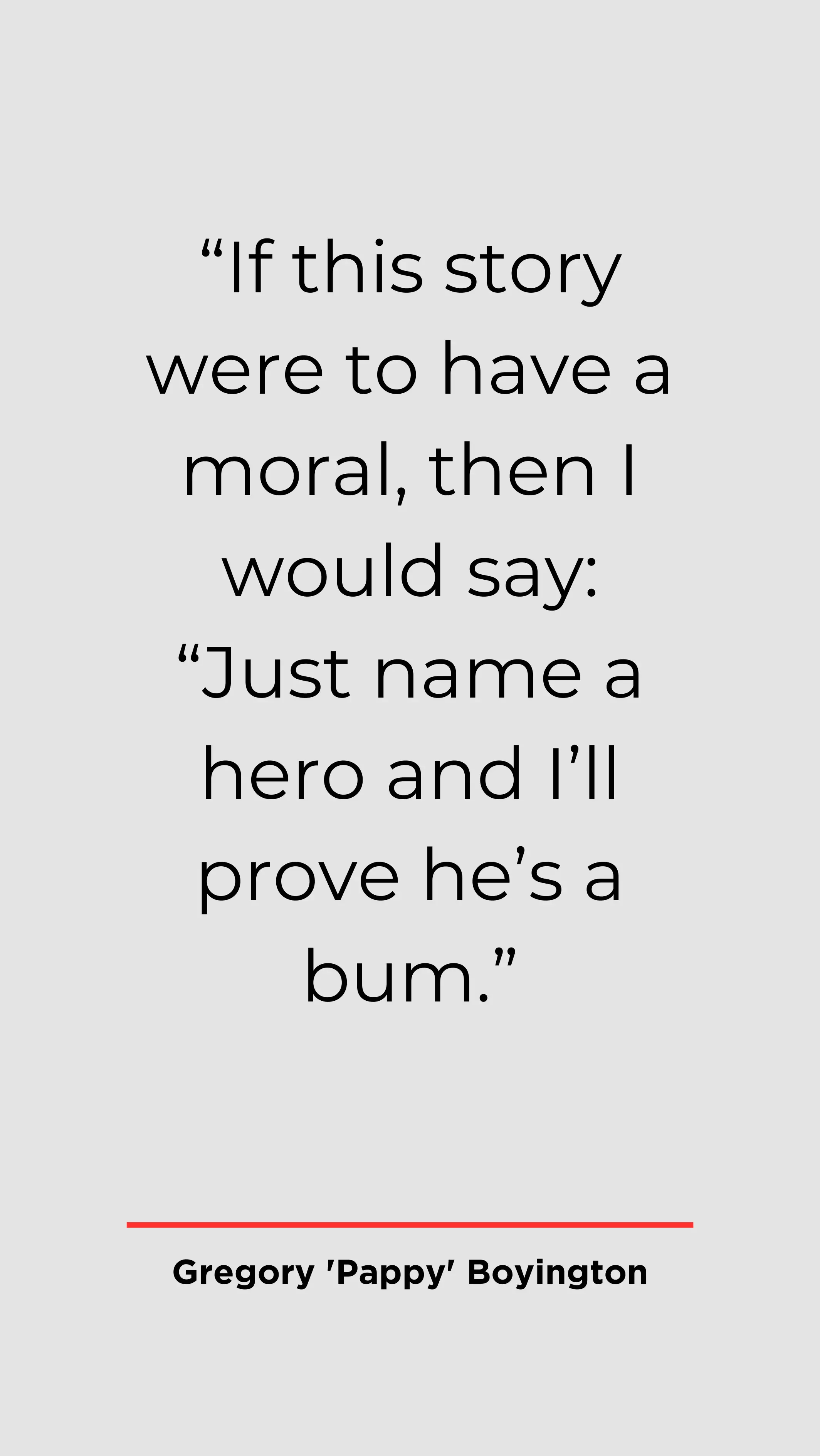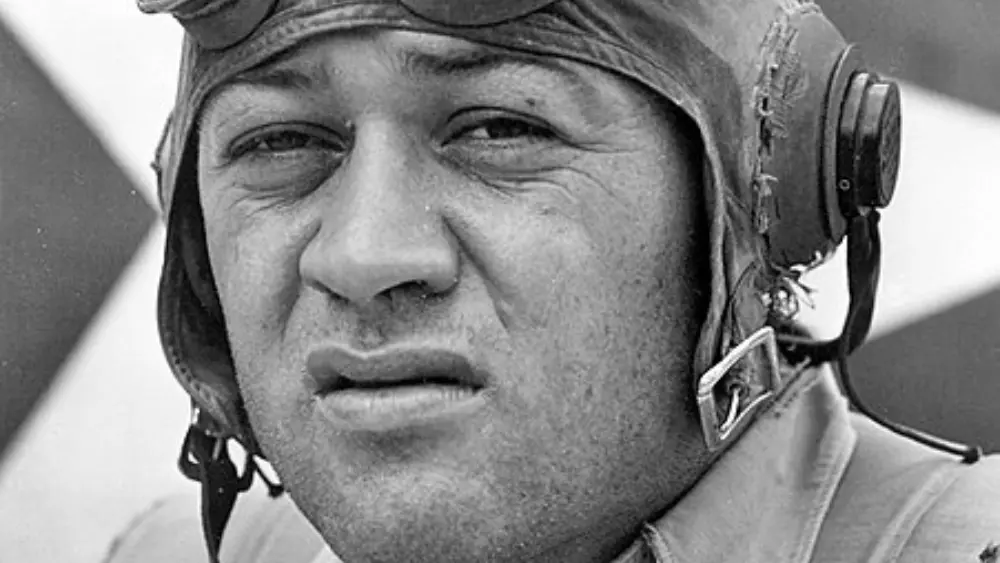Gregory “Pappy” Boyington, a charismatic and daring figure in the history of American military aviation, is best remembered for his leadership as a Marine Corps fighter pilot during World War II. Born on December 4, 1912, in Coeur d’Alene, Idaho, Boyington’s life and service in the Marine Corps left a lasting mark on the world of aviation, earning him a place in legend.
Early Life and Military Service
Early in his life, Gregory Boyington exhibited an unwavering sense of adventure and an indomitable patriotic spirit that would define his remarkable journey. Born into a world filled with possibilities, Boyington’s quest for greatness commenced at the University of Washington, where he laid the foundation for his future exploits. However, it was in 1935 that Boyington took a pivotal step towards his destiny when he joined the Marine Corps Reserve. Little did he know that this decision would set him on a path filled with challenges, triumphs, and a legacy that would forever mark his name in the annals of military history.
Embracing his calling as a Marine, Boyington’s early life and military service would become an epic tale of courage and dedication. His time at the University of Washington was merely the prelude to a life characterized by valor and sacrifice. By enlisting in the Marine Corps Reserve, Boyington embarked on a journey that would test his mettle and push him to the limits of his abilities. Little did he know that he would one day become a symbol of heroism, inspiring countless others to follow in his footsteps.
Gregory ‘Pappy’ Boyington: Flying Tigers and Early Combat Experience
Gregory ‘Pappy’ Boyington’s early aviation exploits took a daring turn even before the United States entered World War II. Motivated by a fervent desire to contribute to the war effort, Boyington volunteered as a pilot with the legendary American Volunteer Group (AVG), influentially known as the “Flying Tigers.” This audacious move saw him take to the skies over China, defending the nation from Japanese aggression. Little did he know that the combat experience he gained during this period would become a crucible, forging his skills and resilience and setting the stage for his remarkable journey in the years to come.
Boyington’s tenure with the Flying Tigers marked a pivotal chapter in his life. His time in the skies of China provided him with invaluable combat experience that would serve as a formidable foundation for his future endeavors. The lessons learned and battles fought amidst the turbulent skies of China would ultimately make Boyington a formidable force in the air, as he later went on to become one of the most celebrated and decorated fighter pilots of World War II. His fearless dedication to defending freedom, whether in the distant skies of China or on the battlefields of the Pacific, would cement his status as a true American hero.
Return to the Marines
As the United States was thrust into the throes of World War II, Gregory ‘Pappy’ Boyington answered the call of duty once more, exemplifying his unwavering commitment to his country. He relinquished his role with the Flying Tigers and, with a renewed sense of purpose, rejoined the Marine Corps. This courageous decision marked a pivotal moment in Boyington’s military career as he returned to the fold, ready to serve on the frontlines of the Pacific Theater.
Rejoining the Marine Corps, Boyington ascended to the position of squadron commander, assuming a leadership role that would define his legacy. In the unruly theater of war in the Pacific, he not only demonstrated remarkable skills as a fighter pilot but also exhibited exceptional leadership qualities. His journey from the skies of China to the Pacific battlegrounds showcased his resilience, determination, and dedication to the cause of defending freedom. Boyington’s return to the Marines marked the beginning of a new chapter in his storied military career, one that would see him rise to legendary status as a fearless leader and ace fighter pilot in the heat of World War II’s most intense battles.
Gregory ‘Pappy’ Boyington: The Black Sheep Squadron
Gregory ‘Pappy’ Boyington’s lasting impact on military history is most prominently defined by his association with the legendary Marine Fighter Squadron 214 (VMF-214), influentially known as the ”Black Sheep Squadron.” Under his leadership, this squadron would become legendary in its own right, embodying the tenacity, courage, and unorthodox tactics that Boyington himself exemplified.
At the helm of the Black Sheep Squadron, Boyington’s leadership prowess shone brightly, earning him the unwavering respect and admiration of his men. He was a commander who led by example, fearlessly taking to the skies alongside his squadron, and his audacious combat skills became the stuff of legend. Boyington’s unorthodox strategies and daring maneuvers in the heat of battle not only rattled the enemy but also solidified his reputation as one of World War II’s most daring and effective fighter pilots. The legacy of the Black Sheep Squadron, under Boyington’s guidance, remains a testament to the extraordinary valor and leadership that defined this remarkable pilot and his band of daring aviators.
Combat Successes and Aceship
Gregory ‘Pappy’ Boyington’s leadership at the helm of the Black Sheep Squadron was synonymous with extraordinary combat successes in the Pacific Theater of World War II. Under his command, this squadron achieved a level of excellence that was nothing short of remarkable, marking its name in history with numerous aerial victories and the relentless destruction of enemy aircraft.
Boyington’s strategic acumen and the fearlessness of his pilots transformed the Black Sheep Squadron into a formidable force in the skies. Their unwavering determination and combat prowess allowed them to not only survive the treacherous dogfights of the Pacific but to emerge victorious time and again. The tally of downed enemy aircraft and aerial victories attributed to Boyington and his squadron stands as a testament to their skill, courage, and relentless pursuit of victory in one of the most challenging and pivotal theaters of World War II. In the annals of military history, Boyington and the Black Sheep Squadron’s combat successes continue to shine as a shining example of valor and achievement in the face of adversity.
Gregory ‘Pappy’ Boyington: Captivity and Return
The zenith of Gregory ‘Pappy’ Boyington’s wartime saga was overshadowed by a harrowing twist of fate in 1944 when he was shot down and subsequently captured by the Japanese. This moment marked a stark departure from his triumphant combat record as he was thrust into the bleak and grueling world of a prisoner of war. Boyington’s resilience and unwavering spirit were tested to the limit as he endured the harsh conditions of captivity, facing physical and psychological hardships that few could comprehend.
It was only at the end of the war that Boyington’s ordeal came to an end, with his liberation from captivity. His return to freedom marked both a personal triumph and a testament to his enduring commitment to his country. Boyington’s journey, which had seen him rise as a fearless fighter pilot and then fall into the clutches of his enemies, ultimately culminated in a dramatic return that added yet another layer to the complex tapestry of his remarkable life.
Medals and Honors
During World War II, Gregory “Pappy” Boyington’s valor and leadership garnered numerous prestigious medals and honors, cementing his status as an enduring American military hero. Among these accolades was the Medal of Honor, the nation’s highest military decoration, recognizing his exceptional bravery in the face of enemy fire. This award symbolized his selfless commitment to fellow servicemen and unwavering dedication to freedom. Boyington also received the Navy Cross, a testament to his exceptional combat skills and outstanding leadership, inspiring his squadron. Additionally, the Purple Heart, awarded for combat wounds, marked his personal sacrifices and unwavering determination in adversity. These honors pay tribute to Boyington’s remarkable contributions to his country and his commitment to defending liberty and justice.
These medals and honors not only celebrate Boyington’s heroism but also represent the collective valor and sacrifices of those who served alongside him, especially the “Black Sheep” squadron under his command. The Medal of Honor, Navy Cross, and Purple Heart recognize the courage of American servicemen during World War II, serving as reminders of the sacrifices made for freedom. Boyington’s legacy continues to inspire future military leaders, emphasizing the enduring importance of honor, leadership, and selflessness in the pursuit of a just and free world. Reflecting on Boyington’s medals and honors reminds us not only of his individual excellence but also of the shared dedication and bravery that defined a generation of American heroes.
Gregory ‘Pappy’ Boyington: Postwar Life and Legacy
Following his wartime service, Gregory “Pappy” Boyington encountered a series of formidable challenges as he transitioned to civilian life. The stark contrast between the rigors of combat and the demands of peacetime existence presented significant hurdles for him. However, Boyington’s indomitable spirit and resilience remained undiminished, propelling him to persevere in his postwar pursuits.
Despite the trials of adjustment, Boyington left an enduring legacy in both aviation and literature. His contributions to aviation continued to stand out as he shared his expertise and experiences with the next generation of pilots, leaving a lasting legacy in the field. Additionally, Boyington’s literary endeavors allowed him to capture the essence of his wartime experiences, sharing them with the world through his writings. Through his postwar life and legacy, Boyington not only confronted the challenges of reintegration but also continued to make meaningful contributions that resonated with the broader public, ensuring that his impact extended far beyond the battlefield.

The Book and Television Series
Gregory “Pappy” Boyington’s autobiography, “Baa Baa Black Sheep,” served as the inspirational foundation for a beloved television series bearing the same name. This convergence of literature and entertainment not only catapulted Boyington’s wartime experiences into the spotlight but also firmly established his enduring presence in popular culture.
The television series “Baa Baa Black Sheep” brought Boyington’s compelling narrative to a wider audience, allowing viewers to witness the drama and heroism of his World War II exploits on their screens. This fusion of literature and television underscored the timeless appeal of Boyington’s story and ensured that his legacy would continue to resonate with generations to come, cementing his place as a legendary figure both in the annals of history and within the realm of popular entertainment.











